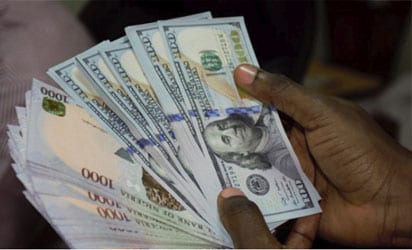Naira depreciation threatens Nigeria’s economy’s outlook – The continuing depreciation of the naira is affecting business activities and threatening Nigeria’s corporate outlook with wide implications for the economy, the Lagos Chamber of Commerce and Industry (LCCI), Dr. Chinyere Aloma has said.
In an interview, Almona lamented that what the country is going through is a case where the supply of foreign exchange (forex) does not meet the demand, putting persistent pressures on the naira and leading to its weak position against major currencies.
She revealed that many businesses source their forex needs from parallel markets at above N525 per dollar.
The naira depreciated across the counters at the weekend, stoking anxieties over a free fall. At the official Investors and Exporters ( I & E) Window, the naira depreciated by 0.21 percent to N412.88 per dollar as demand appeared to have outweighed supply. The naira depreciated at the Bureau De Change and parallel markets by 4.09 per cent and 4.59 per cent to close at N560 and N570 per dollar.
Meanwhile, naira closed flat at N380.69 per dollar at the Interbank Foreign Exchange market amid weekly injections of $210 million by Central Bank of Nigeria (CBN).
“In the new week, we expect the naira to further depreciate against the dollar as CBN’s intention to go against illegal dealers in the forex market may take time before the desired results begin to manifest,” Cowry Asset stated the weekend.
Analysts at Afrinvest West Africa said the weeks ahead would be crucial determinant of the viability of the CBN’s insistence that banks have enough supplies to cater for legitimate forex needs.
“We need to boost the supply side of the forex market through more inflows from exports, diaspora remittances and crude revenue,” Almona said.
On the concerns that weak macroeconomic conditions and the pressure on Nigeria’s real sector would have implications for unemployment, she responded that Nigeria needs more investments in infrastructure and access to credit for targeted job-rich sectors like agriculture, construction, technology and entertainment among others.
“We also need to support the recovery of the economy with more investment in vaccination, tackle insecurity, and boost supply of forex for importation of critical raw materials for production. All these will strengthen the real sector to create jobs, produce more to reduce inflation rate and consequently reduce crime and violence in our land,” Almona said.
On other feasible ways the Federal Government could boost revenue seeing that investments are dwindling, oil demand is dropping and businesses are suffering, she outlined that the Chamber had made a recommendation recently to the Federal and state governments on how they could package state and national assets to attract equity investments that can raise revenues for government instead of borrowing.
“This recommendation is not about selling our national assets but finacialising and commercialising them for needed revenue without losing them to outright sale. We can also widen the tax net to capture more tax bases and activities. But it should also follow that the sources of taxes are catered for to thrive in their businesses so they can pay taxes to government,” Almona said.
On the incessant borrowing by the administration from various countries, she noted that borrowing might not necessarily be bad but wise use of debts to fund critical infrastructure that in turn support businesses is important.
“Debts should be tied to capital projects that can support the ease of doing business in Nigeria. Loans should be tied to projects that can boost revenue. This will improve our debt-to-revenue ratio from 91 percent downwards. Debts should not be used to fund recurrent expenditure while capital projects suffer from lack of funds,” Almona added.































